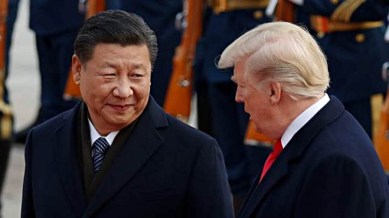Stay updated with the latest - Click here to follow us on Instagram
China hits back at US, raises tariffs to 84% starting April 10
China US Trade Retaliation: The move comes in direct retaliation to President Donald Trump’s sweeping tariff package on Chinese imports, which is set to take effect the same day.

China US Trade Retaliation: China will raise tariffs on a wide range of US goods to 84 per cent starting Thursday, a sharp escalation from the previously announced 34 per cent, the country’s finance ministry said in a statement on Wednesday.
The move comes in direct retaliation to President Donald Trump’s staggering 104 per cent on Chinese imports, which is set to take effect today.
monthly limit of free stories.
with an Express account.
China has pledged “resolute and forceful” countermeasures after sweeping — part of a wider package targeting 60 countries — officially came into effect just after midnight Wednesday US time.
Speaking at a daily press briefing, Chinese Foreign Ministry spokesperson Lin Jian condemned Washington’s moves in stark terms. “China continues to take firm and resolute measures to safeguard our legitimate rights and interests,” he said. “We will not tolerate any attempt to harm China’s sovereignty, security and development interests.”
Lin accused the US of abusing tariffs as a tool of coercion and said Beijing firmly opposes what he called “bullying and hegemonic acts.” The escalating rhetoric underscores the hardening standoff between the world’s two largest economies as tensions continue to spiral.
Earlier in the day, China sharply criticised the Washington at the World Trade Organization, warning that Trump’s sweeping reciprocal tariffs threaten to further destabilise global trade and violate WTO rules.
“The situation has dangerously escalated… China expresses grave concern and firm opposition to this reckless move,” Beijing said in a statement to the WTO, shared with Reuters by its mission in Geneva.
Addressing a WTO meeting on trade in goods, China argued that the US action undermines the multilateral trading system. “Reciprocal tariff is not — and will never be — a cure for trade imbalances. Instead, they will backfire, harming the US itself,” the statement added.
Trade war
The looming slugfest between the world’s two largest economies is casting a dark shadow over global trade, with analysts raising the spectre of an American recession.
China and the United States edged dangerously close to a full-blown trade war on Tuesday after President Donald Trump announced a staggering 104 per cent tariff on all Chinese imports. Locked in an escalating showdown, neither side showed signs of backing down — with Beijing vowing to resist US pressure “to the end.”
Trump initially imposed a 34 per cent tariff on Chinese goods, which was swiftly met with an equivalent retaliatory measure by Beijing. In response, the US added another 50 per cent in duties. When combined with earlier levies from February and March, the total tariff burden on Chinese imports under Trump’s second term now stands at 104%, bringing fears of a near-embargo scenario.
In February, Donald Trump slapped a 10 per cent tariff on all Chinese goods with no carve-outs, citing Beijing’s alleged role in fuelling illegal immigration and facilitating the flow of fentanyl into the United States. Last month, he doubled those rates — a move that sent shockwaves through global markets and deepened already strained US-China relations.
China, which was America’s second-largest source of imports last year, shipped $439 billion worth of goods to the US, compared to $144 billion in American exports to China. The rising tariffs now threaten to hit domestic industries hard, with businesses warning of cost surges, layoffs, and reduced competitiveness.
By the end of Trump’s first term, the average US tariff on Chinese goods stood at 19.3 per cent, according to the Peterson Institute for International Economics. The Biden administration largely maintained those tariffs — even expanding them — bringing the average to 20.8 per cent.
Such extreme levies could trigger an unmanaged decoupling of trade between the US and China — the world’s largest importer and its largest exporter. In the immediate term, this risks reigniting volatility in global markets, which had only just begun to stabilise.